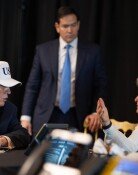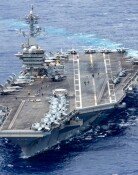Calls in US Rising for Military Action on N. Korea
Calls in US Rising for Military Action on N. Korea
Posted May. 30, 2009 08:17,
Calls are growing in the United States on the possible use of military force against North Korea in light of the Norths second nuclear tests and missile firings.
The call for military action, which has virtually disappeared since the first term of the George W. Bush administration, stems from Washingtons growing frustration over lack of responses to Pyongyangs escalation of provocations.
This time, however, most who are urging the military action option are not Republicans or neo-conservatives but Democrats who have championed dialogue with Pyongyang. While conservative hardliners, including former U.S. Ambassador to the United Nations John Bolton, focus on stopping the six-party talks and strengthening sanctions on North Korea, the doves want a broader spectrum of responses ranging from direct talks to military action.
Former U.S. Defense Secretary William Perry, the architect of the Perry Process, a comprehensive approach to the North Korean nuclear program, told a forum in Washington Thursday that if non-military options do not stem the Norths escalation of tension, the United States must consider others, namely military options.
A diplomatic approach can work only if it includes meaningful coercive factors, Perry said, so military options should at least be considered to stop further nuclear tests.
A military option will require a clear agreement from the South Korean government, he said, adding that Washington should not put military options into practice without significant talks with allies to be affected by the military options.
In an interview with The Dong-A Ilbo last month just before the Norths launch of long-range missiles, Philip D. Zelikow, who designed the comprehensive and bold approach to the North under the Bush administration, also proposed a preemptive U.S. strike on North Korean missiles placed on launch pads.
He also said Washington cannot stand idly by and watch the North combine its existing nuclear weapons with long-range missiles that have seen technological completion. He urged the removal of the source of a potentially huge threat.
Michael O`Hanlon, a senior researcher at the Brookings Institute, told a forum Wednesday that if the North begins to sell nuclear materials to terrorist groups or other countries, the Obama administration will seriously consider military sanctions.
These arguments are interpreted as recommendations to Washington to consider surgical strikes as a last resort, on the Norths nuclear and missile facilities if non-military pressure fails to work.
sechepa@donga.com triplets@donga.com







